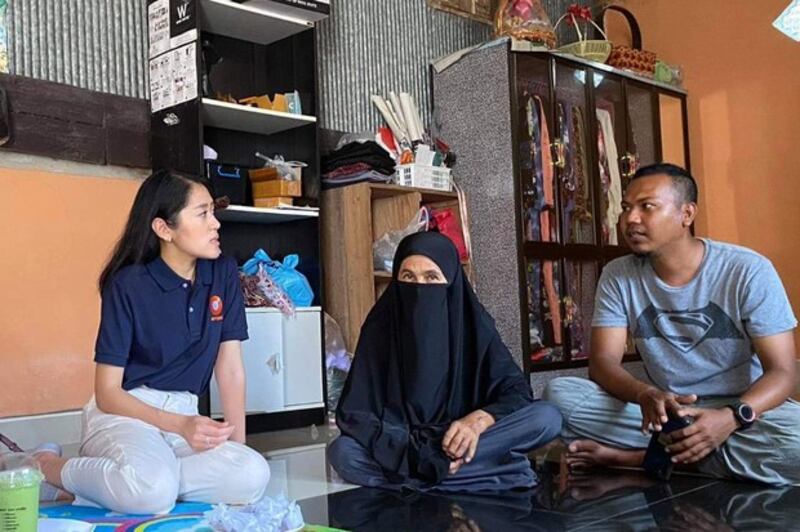Relatives of a suspected rebel who fell unconscious and died while in military custody in Thailand’s Deep South expressed disappointment Monday after the national human rights commission notified them it had ended its investigation without finding clear medical evidence on the cause of his death.
Abdullah Esomuso, 34, was found unconscious at 3 a.m. July 21, 2019, in an interrogation center at an army camp in Pattani province, where he had been held for 10 hours, prompting his family to question if military interrogators had tortured him. After falling into a coma, he died in a hospital on Aug. 25, 2019, while still in military custody.
Muhammad Nomud Mamud, Abdullah’s cousin, who petitioned the office of the National Human Rights Commission of Thailand (NHRC) two years ago to investigate, said he received a notification letter and a report from the agency on Sunday.
“We relatives are very disappointed, desperate and have no faith left in this commission,” Abdullah’s cousin told BenarNews on Monday. “What right does it have to end the investigation when the relatives have not received justice yet?”
Abdullah had been taken into custody after a suspected insurgent cell leader implicated him in a series of attacks by rebels, officials had said.
The NHRC report said officials visited the interrogation center at least three times before ending the probe.
“There was no clear medical evidence to show what had caused his death … and there was no evidence to confirm who had injured or sickened him either,” the commission said in an 11-page document seen by BenarNews.
“Also, hearings about the cause of death have been going on in a court therefore the NHRC no longer has the duty to investigate this according to the Human Rights Act.”
An official at an NGO in the Deep South said the commission did not need to end the probe.
“In fact, the Songkhla hearing on the cause of death is a matter of investigating a possible crime, but the NHRC has a duty to investigate human rights violations,” Pornpen Kongkachonkiet, director of the Cross-Cultural Foundation, told BenarNews.
“The commission’s document showed a narrow interpretation and its members are not performing their duty.”
On Oct. 1, 2019, the family filed a complaint with police in Pattani leading to hearings on the autopsy at a criminal court in Songkhla province that began in November 2020, according to the lawyer. The next hearing is scheduled in August.
The Thai military has been in charge of security for 15 years in the mainly Muslim and Malay-speaking Deep South after a separatist insurgent uprising re-ignited in 2004. About 7,000 people have been killed since then in violence across the southern border region.
During that time, rights groups have accused the military of using excessive force in the Deep South, including systematic torture and extrajudicial killings against insurgents.

Autopsy findings
Soon after Abdullah’s death, Maj. Gen. Pramote Prom-in, who was serving as spokesman of ISOC-4, the regional military command, said the military assigned the Committee to Protect Human Rights in the Deep South to investigate to determine the facts of the case.
The committee is a military-backed body that is made up of clerics, civilians and officials. It also set up a disciplinary committee to investigate officials who could have been responsible.
In late August 2019, Abdul-asib Tadae-ing, who sits on the committee, said doctors who conducted the autopsy reported finding no signs of torture.
“According to the doctors, the cause of death was severe pneumonia and septic shock, which happened after he had suffered from hypoxic ischemic encephalopathy [oxygen deprivation to the brain],” Abdul-asib said in a statement in August 2019.
“The oxygen deprivation could mean torture such as suffocation with a bag, water boarding as some people claimed, or simply [that] he fainted without receiving CPR. The doctors said torture would show traces such as hemorrhaging in the eyes, swollen gums and a darkened face, which were not found in the case of Abdullah.”
After Abdul-asib’s statement, MARA Patani spokesman Abu Hafiz Al-Hakim had said the brain swelling could have been caused by torture by suffocation or water intoxication.
MARA Patani at the time was an umbrella organization of Deep South insurgents groups and factions involved in regional peace talks.
A lawyer with the Muslim Attorney Center (MAC) who has assisted Abdullah’s family, alleged that the rebel suspect had been tortured.
“Prosecutors’ witnesses, including doctors testified that the death was not caused by a human, while we presented that Abdullah was deprived of oxygen due to the acts of humans,” Abdulqahhar told BenarNews, referring to earlier hearings.
